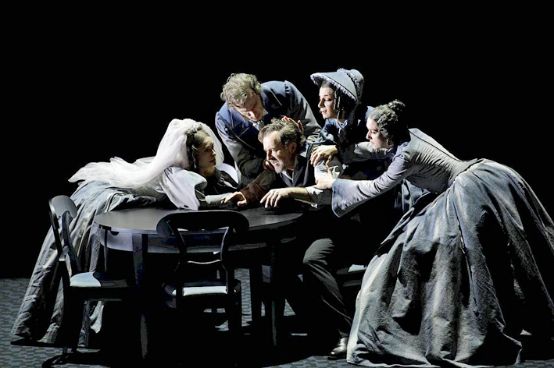Tender background noise
Heinz Holliger conducted the world premiere of his opera "Lunea - Lenau-Szenen in 23 Lebensblättern" at Zurich Opera House on March 4.

The music begins without a conscious start. Delicate arpeggios on the harp, the cimbalom and the piano mingle with the lie notes in the wind instruments, humming chords and bells to create a stream of sound that is always in motion. Heinz Holliger's new opera Luneaconducted by himself at its world premiere at Zurich Opera House, never stands still. The music is a single fluid. Even the many points of calm are animated and are reminiscent of a dark lake whose surface is rippled by a breeze. Over forty different instruments are played by the four percussionists, from washboard to sandpaper. Holliger prefers to speak of "stroking instruments", that's how carefully the musicians have to act, that's how gentle the background noise is that Lunea enveloped. With his highly sensitive, richly colored music, Holliger wants the listener to discover the inner world of the poet Nikolaus Lenau (1802-1850): his melancholy moods, his abysses, but also his bright and visionary thoughts.
Done without a sting
Five years ago, the Swiss composer set 23 notes by the restless Austrian poet of world-weariness to music as a song cycle and later orchestrated them for a chamber orchestra. Together with librettist Händl Klaus, he has now developed an opera lasting around 100 minutes, which he subtitles "Lenau Scenes in 23 Leaves of Life". This musical theater is not based on a plot; a chronology was deliberately avoided. The open form of the texts is also reflected in the conception of the opera. The five vocal soloists take on several roles, whereby the boundaries are fluid. Lenau's platonic lover Sophie von Löwenthal is also his mother, and his friend Anton Schurz is also his alter ego. The stages of his life, which are more alluded to than precisely drawn, follow a dream logic. The stroke of September 29, 1844 - Nikolaus Lenau called it Riss - which paralyzed one side of his face and gradually drove him mad, is an axis from which the story is told in both directions. Memories and gloomy glimpses of isolation join hands. Another axis forms the exact center of the work: the twelfth page. From here onwards, some words and entire sentences are spoken backwards. Schuldig becomes gidlusch, Feuer becomes Reue, whereby the missing F is bracketed in the libretto. In Andreas Homoki's aesthetic production, the black wall between the scenes is moved at a snail's pace from left to right, i.e. in the opposite direction (set design: Frank Philipp Schlössmann). That's too much headiness and too little theatricality. There is no compelling, audible connection to the music. Just as there is no real tension between the poorly contoured figures on this dreamlike evening on the black stage. The characters, dressed by Klaus Bruns in elegant, shimmering blue Biedermeier dresses and frock coats, are carefully guided by Andreas Homoki. The scenes appear like paintings, the changing arrangements like family constellations. But the deliberately vague constellation of characters creates an arbitrariness that takes the sting out of the action.
End without closure
With the baritone Christian Gerhaher, who has already performed the Lunea-song cycle, Holliger has chosen the most suitable interpreter for this elusive title character. Gerhaher animates even the smallest melodic phrase. One recognizes the great Lied interpreter in his sensitive interpretation of the text and the tonal shadings. Despite its avant-garde search for sound (without any electronics!), Holliger's music is highly romantic at its core, and the vocal lines radiate intensity and beauty. Juliane Banse (Sophie von Löwenthal), who already sang the title role in Heinz Holliger's first opera Snow White in the Zurich premiere in 1998, embodies a deeply emotional soulmate with a dark soprano coloration and great breath. With her agile, crystalline soprano, Sarah Maria Sun brings Lenau's past loves with an opera singer and a mayor's daughter to life. Ivan Ludlow with his not quite free-flowing baritone and Annette Schönmüller with her balanced mezzo are unable to give Lenau the necessary support as the married couple Anton and Therese Schurz. The outstanding Basel madrigalists are part of Biedermeier society or echo thoughts backstage. Holliger interweaves the stage action very closely with the excellent Philharmonia Zürich, when sibilant sounds are continued in the orchestra pit and the double bass clarinet's buzzing continues in the deep basses. Voice and instrument join hands. The precision with which the composer brings his own music to life delights the premiere audience. The balance is perfect, the overall sound always round and transparent. At the end, the poet becomes increasingly lonely and dark. The aphorism "Man is a sandpiper on the sea of eternity" is projected onto the empty stage. The strings of harmonics played in triple piano and the delicate glissandi of the winds stretch out time one last time and gradually dissolve into nothingness. An end without a conclusion.








